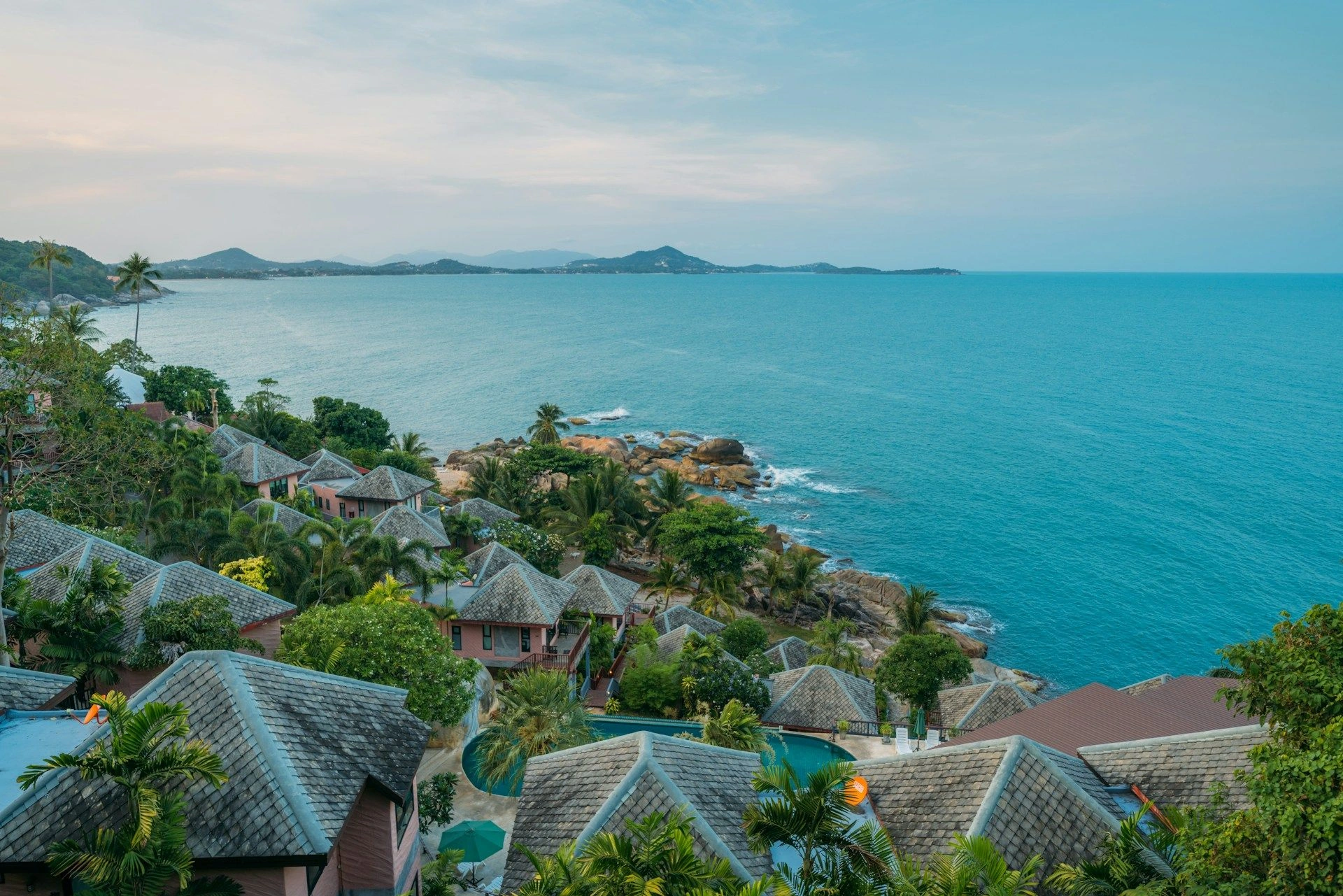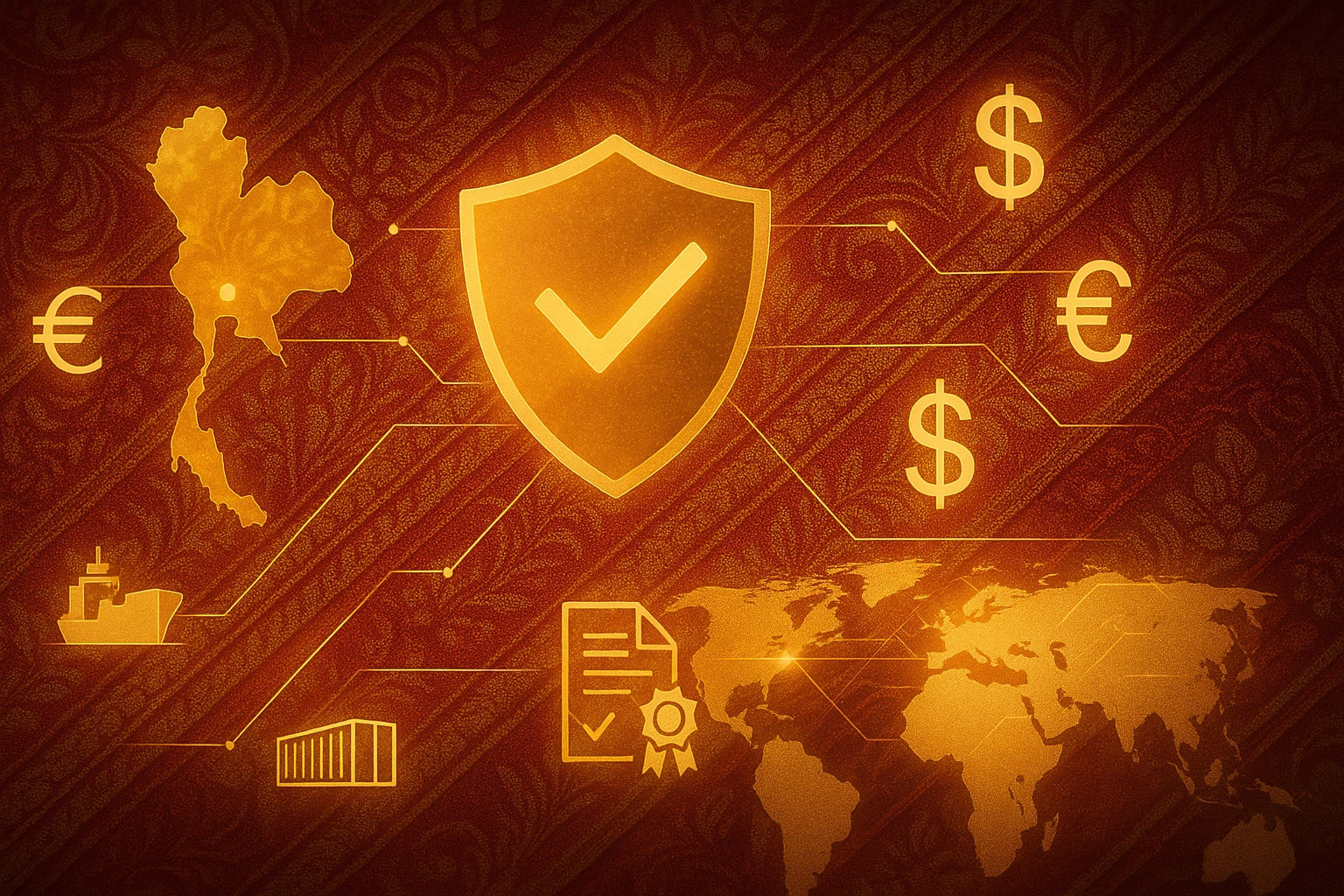Co-Ownership Real Estate Opportunities in SamuiIsland paradise access withhigh-yield rental returns

Advantages of Fractional
Investments in Thailand
International Airport Link
Koh Samui International Airport connects to Bangkok, Singapore, and Hong Kong. Easy access fuels year-round tourism and expatriate arrivals, sustaining strong demand for rental property and ensuring stable occupancy rates.
Diverse Property Portfolio
From beachfront condos to jungle villas, Samui’s real estate market offers varied asset classes. Fractional investors can diversify across multiple high-demand segments—luxury resorts, eco-lodges, and serviced apartments—within a single investment.
Eco-Tourism Growth
Rising interest in sustainability and wellness boosts long-stay bookings at eco-resorts and health retreats. This sector’s expanding clientele guarantees consistent rental income and supports appreciation of fractional property in Samui.
International Airport Link
Koh Samui International Airport connects to Bangkok, Singapore, and Hong Kong. Easy access fuels year-round tourism and expatriate arrivals, sustaining strong demand for rental property and ensuring stable occupancy rates.
Diverse Property Portfolio
From beachfront condos to jungle villas, Samui’s real estate market offers varied asset classes. Fractional investors can diversify across multiple high-demand segments—luxury resorts, eco-lodges, and serviced apartments—within a single investment.
Eco-Tourism Growth
Rising interest in sustainability and wellness boosts long-stay bookings at eco-resorts and health retreats. This sector’s expanding clientele guarantees consistent rental income and supports appreciation of fractional property in Samui.

Useful articles
and recommendations from experts
All
Global Transactions
Popular
Thailand
How to Make Secure International Payments to Thailand in 2025 — Complete Compliance Guide
How to send and receive payments to Thailand without risks
14.08.2025

All
Global Transactions
Popular
Thailand
International Property Payments to Thailand — Secure Real Estate Deals for Global Buyers
How to send secure property payments to Thailand as a foreign buyer
14.08.2025

Global Market Guides
Real Estate News & Trends
Investment
Thailand
China, Russia and the USA made up the top three for purchasing apartments in Thailand
China, Russia and the USA made up the top three for purchasing apartments in Thailand
29.12.2023

All
Popular
Thailand
Affordable Domestic Flights in Popular Tourist Countries
Affordable Domestic Flights in Popular Tourist Countries
22.10.2023

Fractional Real Estate Investments in Koh Samui, Thailand
Why Koh Samui is attractive for investors
Koh Samui, Thailand’s second-largest island, has transformed from a backpacker’s haven into an upscale international destination. With over two million annual visitors, including luxury tourists, digital nomads, and expatriates, the island generates robust year-round demand for both short-term and long-term accommodation. This diversity makes Samui a prime location for investment property in Samui.
The island’s international airport operates nonstop flights to and from major Asian cities such as Singapore, Hong Kong, and Kuala Lumpur, providing seamless connectivity. Enhanced ferry services to Koh Phangan and Koh Tao, along with upgraded highways, ensure efficient inter-island transport. Government plans under Thailand 4.0 and the Eastern Economic Corridor extension will further upgrade maritime infrastructure, driving future growth.
Samui’s climate, with stable temperatures and refreshing monsoon seasons, appeals to retirees and wellness seekers. Rising healthcare standards—led by Samui International Hospital—and expanding international school options reinforce long-term residency trends. The island’s sustainable development initiatives, including renewable energy projects and marine conservation zones, align with global eco-tourism trends, bolstering demand for rental income in Samui and supporting fractional property in Samui models.
Property types and ownership models
Samui’s real estate spectrum spans beachfront condominiums, hillside pool villas, eco-lodge cabins, and mixed-use resort developments. Prime zones include Chaweng Beach—known for vibrant nightlife and retail—Maenam’s quiet family enclaves, and Bophut’s Fisherman’s Village charm. Each area caters to distinct tenant segments, from party-goers to wellness retreat participants.
Full ownership of condominium units allows foreigners to hold up to 49% of a project’s floorspace, while land and villa purchases require company structures or leasehold agreements. Fractional property in Samui emerges as a flexible alternative: investors acquire shares in SPVs that hold title deeds, granting proportionate rental and resale profits. Entry points start at USD 10,000, making co-ownership real estate in Samui accessible for diversified portfolios across multiple developments.
This co-ownership model reduces single-asset risk and spreads capital across different neighborhoods. Fractional investors can select income-focused beachfront suites or appreciation-driven hillside villas within one investment contract. Shared ownership agreements detail usage schedules, management fees, profit distribution, and exit terms, ensuring clear governance and investor protection.
Legal rules for fractional investments in Thailand
Thailand’s Condominium Act permits foreigners to own condominium units outright, provided foreign-held units do not exceed the 49% quota. For other property types, fractional investments typically use 30-year renewable leaseholds or SPV-based co-ownership structures under Thai corporate law. These SPVs issue shares correlating to unit value—each share representing a specific percent of rental income and capital gains.
Investors should verify that SPV agreements include bilingual (English–Thai) contracts registered with the Land Department. Key clauses must specify revenue distribution formulas, maintenance obligations, dispute resolution mechanisms, and exit procedures. Legal due diligence involves verifying land title deeds, environmental permits, and building approvals, ensuring that fractional investments comply with local zoning and Land Code provisions.
Fractional co-ownership real estate in Samui also benefits from Thailand’s transparent land registry system. Title search certificates and official maps are publicly accessible, reducing the risk of encumbrances. SPV shares are transferable under clearly defined conditions, allowing co-owners to sell shares on secondary markets or back to the managing entity, subject to fund terms.
Rental income and demand trends in Koh Samui
Rental income in Samui is underpinned by a balanced mix of visitor types. During high season (December–March), average daily rates (ADR) for premium beachfront villas reach THB 20,000–30,000, with occupancy above 80%. Low season still attracts wellness retreats and long-stay visitors, maintaining occupancy between 50% and 65%—significantly higher than many global resort destinations.
Long-term rentals appeal to retirees, expatriates, and digital entrepreneurs seeking reliable internet and modern amenities. Monthly rents for one-bedroom serviced apartments in central Bophut and Choeng Mon average THB 25,000–35,000, yielding gross returns of 5–7%. Combined with short-term holiday rentals, average annual yields for well-located properties range from 6% to 9%, making rental income in Samui both stable and attractive.
Market analyses demonstrate average annual price appreciation of 7–10% in premium zones such as Chaweng Noi and Plai Laem. The expansion of wellness centers, international schools, and healthcare facilities further diversifies demand. Fractional investors gain exposure to this dynamic rental market without the complexities of direct property management.
Why choose fractional property investment
Fractional property investment in Samui allows non-resident buyers to bypass high capital requirements and extensive legal procedures. By purchasing fractional shares in revenue-producing assets, investors access multiple properties—beachfront condos, hillside villas, and resort suites—within one portfolio. This diversification of co-ownership real estate in Samui mitigates location risk and enhances overall personal wealth strategy.
Professional management teams handle tenant sourcing, maintenance, marketing, and financial reporting. Co-owners receive scheduled distributions—quarterly or biannually—reflecting net rental income. Online dashboards provide transparency, showing occupancy metrics, net operating income, and distribution history. These features simplify how to invest in Samui’s real estate market without sacrificing oversight.
Fractional models often include owner-use privileges, allowing co-owners to enjoy personal stays during off-peak periods. This hybrid approach combines lifestyle benefits with passive income generation, appealing to investors seeking both financial and personal utility from their investments.
Flexible exit strategies and tax considerations
Fractional investments incorporate predefined exit mechanisms. Common options include scheduled buybacks at project maturity (typically 3–5 years), share resale on secondary platforms operated by the SPV, or transfer to third-party buyers subject to managing entity approval. Clear valuation methods, often tied to independent appraisals or market indices, are specified in advance, ensuring predictable exits.
Taxation on rental income is collected at source, with a 15% withholding tax applied before distributions. SPV structures handle corporate-level taxes, minimizing direct personal liabilities for co-owners. Stamp duties and transfer fees for initial setup are included in investment costs, while ongoing SPV administration covers local service taxes and maintenance levies.
Investors receive annual tax certificates and financial statements, facilitating global tax compliance. Platforms may offer liaison services with home-country advisors to optimize international tax planning. This integrated approach streamlines both passive income real estate in Samui and residential ownership rules.
How VelesClub Int. supports your investment
VelesClub Int. curates top-tier fractional real estate opportunities in Samui through partnerships with established Thai developers, legal firms, and property managers. Each SPV-based co-ownership offering undergoes rigorous due diligence—title verification, zoning compliance, environmental assessments, and financial modeling. Entry points begin at USD 10,000, granting access to high-performing assets.
Our end-to-end services include legal documentation, asset setup, rental operations, revenue collection, and distribution. Investors gain 24/7 access to a secure online portal featuring real-time performance metrics—occupancy rates, ADR, net cash flow—and exit options. Secondary share purchase and resale services provide liquidity beyond fixed-term expirations.
Whether you aim for passive income, capital appreciation, or periodic owner stays, VelesClub Int.’s transparent fractional investment contracts in Samui deliver professional management, regulatory compliance, and seamless investor experiences across Thailand’s island markets.
